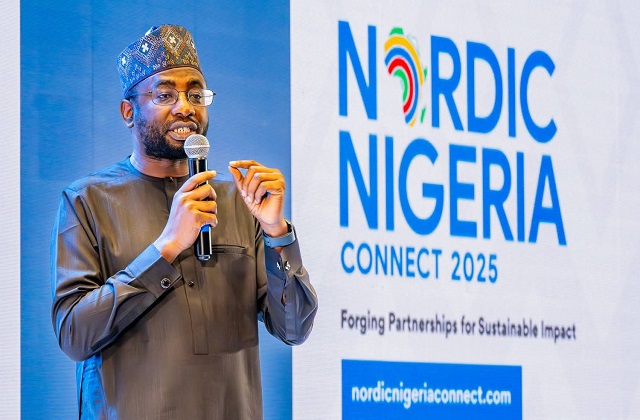Nigeria is taking bold steps to secure its digital sovereignty and chart a sustainable technological future built on innovation, inclusivity, and resilience.
At the heart of this vision is a determination to shift from dependency on foreign systems to a self-sustaining digital economy driven by homegrown solutions and empowered citizens.
This commitment formed the central message of a keynote address by Kashifu Inuwa Abdullahi, Director General of the National Information Technology Development Agency (NITDA), at the NORDIC Nigeria Connect 2025 held in Lagos.
Speaking on the theme “Nigeria’s Digital Infrastructure Ambition and Path to Sustainability,” Inuwa said Nigeria’s digital transformation extends beyond building data centres or laying fibre cables, it is about re-engineering the nation’s economic and social fabric for a new era of prosperity anchored on digital independence.
“Our digital ambition transcends infrastructure. It’s about designing and building a new societal fabric—a new economic operating system for Nigeria founded on inclusivity, resilience, security, and digital prosperity,” he said.
He explained that the country’s digital vision is built on two interconnected layers: the Shared Digital Backbone and the Operational Backbone.
The Shared Digital Backbone covers the physical infrastructure, terrestrial fibre optics, subsea cables, green data centres, and sovereign cloud services, to secure Nigeria’s data and ensure national digital sovereignty.
The Operational Backbone, representing the software layer, comprises Nigeria’s Digital Public Infrastructure (DPI), interoperable systems like digital identity, payment frameworks, and data exchange platforms that form a unified ecosystem enabling startups to innovate locally and scale globally.
Citing the recent global cloud outage experienced by Amazon Web Services (AWS) that disrupted several African nations, Inuwa stressed the urgency of building internal capacity:
“This incident reminds us that relying solely on foreign cloud regions does not ensure business continuity or digital independence. We must build the capacity for digital self-determination.”
Inuwa outlined Nigeria’s journey toward a sustainable digital future around three foundational pillars: Policy, People, and Partnerships.
Under the Policy Pillar, he noted that the government is fostering a predictable, pro-innovation regulatory environment through instruments such as the Nigeria Startup Act and the Data Protection Act, designed to balance investor confidence with consumer protection.
For the People Pillar, Inuwa emphasised that technology is only as strong as the people behind it. Through initiatives like the National Digital Literacy Framework and the Three Million Technical Talent (3MTT) Programme, Nigeria is nurturing a new generation of innovators capable of driving the digital economy.
Under the Partnership Pillar, he underscored the shift from ad-hoc collaborations to structured global partnerships that attract investments and enable technology co-development, including in Artificial Intelligence (AI).
Inuwa revealed several ongoing initiatives translating this vision into tangible outcomes.
On infrastructure, the Project BRIDGE initiative is expanding Nigeria’s terrestrial fibre network to 125,000 kilometres through public-private partnerships. The National Sovereign Cloud Initiative is strengthening data sovereignty by developing a competitive cloud ecosystem within Nigerian jurisdiction.
On the software front, the Nigeria Stack integrates nationwide systems for digital identity, payments, and data exchange, while the OneGOV platform aims to unify all government services under a single digital portal for citizens.
He also highlighted ongoing research and innovation at the National Centre for Artificial Intelligence and Robotics (NCAIR), including projects like the AI Collective and N-ATLAS, Nigeria’s indigenous large language model initiative.
Inuwa called for deeper collaboration within Nigeria’s tech ecosystem and stronger international partnerships, describing the Nordic region as a strategic ally in Nigeria’s digital journey.
“We see immense opportunities to leverage Nordic expertise in technology and innovation while offering Nigeria’s vast talent pool and creative potential in return,” he said.
Reaffirming NITDA’s commitment to Nigeria’s digital future, Inuwa concluded:
“With clear vision, deliberate strategy, and inclusive policy frameworks, we are confident that Nigeria will not only achieve digital sustainability — we will lead Africa’s digital transformation.”

